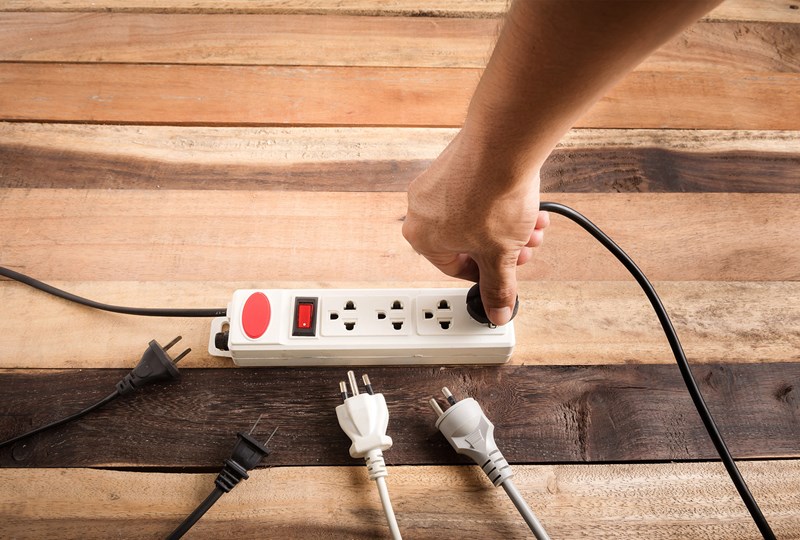
Key Insights
- To lower your summer energy bills, focus on turning off “vampire appliances” that can cause your home’s energy use to skyrocket.
- Purchase a programmable thermostat or stick to hard-and-fast rules about when the air conditioning goes on.
- Check for leaks and gaps in your windows and doors to ensure your cool air isn’t escaping outdoors.
Nix vampire energy
A recent report shows that “vampire” electronics — which output energy even when they’re not being directly used — make up 25% of a home’s energy use and potentially cost the average American homeowner as much as $200 per year in idle energy bills.
Take some time to learn which appliances are the biggest offenders, and which ones aren’t worth the effort. Some appliances, like microwaves or ovens with clock features, may use a small amount of vampire energy while providing a clear convenience to the household. Other devices, like cable boxes, speakers and video game consoles, use a significant amount of energy despite adding no value when they’re not in use; be sure to turn off or unplug such devices when you are done using them. Surge protectors with an on/off switch can make this an easier endeavor.
Get a programmable thermostat
An HVAC system is one of the biggest energy vampires in your home. Consider purchasing a programmable thermostat, which works on a schedule to adjust the temperature according to your preferences, the time of day and the day of the week.
For a relatively low upfront cost, you can expect to save up to 10% on your energy bills annually by leveraging a smart thermostat.
Set two temperatures and stick with them
If a programmable thermostat is out of the question, you can still regulate your energy use by determining how hot it has to be outside to turn on the air conditioning (AC) inside and how low you’ll set your AC when you do turn it on.
Share the set temperatures with your family and expect some whining and deal-making to ensue. Make an additional agreement that the last person to leave the house each day should turn the AC off or lower it on super-hot days.
Check for holes and leaks
Remember when your mom or dad would yell at you to close the door or windows because you were “cooling down the whole neighborhood?!” Well, they were right in more ways than they knew.
Leaks and cracks around your doors and windows allow cool air to escape so your air conditioning has to work twice as hard to keep the indoor temperatures regulated. Plug up holes and seal cracks using foam, caulking and extra insulation to lower your energy use.
Keep your home shaded when possible
Natural light is wonderful, but the heat from the sun will also prevent your home from cooling down. Keep your shades closed when you’re not using the room to prevent the sun from neutralizing the air conditioner’s efforts.
Lean into natural cooldown methods
To prevent a family-wide mutiny on hot days when the AC isn’t doing enough, be sure to promote healthy, natural cooldown methods:
- Keep pitchers of water, iced coffee or lemonade in the refrigerator
- Wear light-weight clothes around the house and to bed
- Keep cold compresses in the freezer for a quick respite
- Keep air circulating with well-positioned fans
Prepping to sell?
Adding energy efficiency to your home can go a long way when it comes time to sell. Learn about other home improvements that help sell a home and reach out to Edina Realty to start the buying or selling process.









 ©2025 Prosperity Home Mortgage LLC®. (877) 275-1762. 3060 Williams Drive, Suite 600, Fairfax, VA 22031. All first mortgage products are provided by Prosperity Home Mortgage, LLC®. Not all mortgage products may be available in all areas. Not all borrowers will qualify. NMLS ID #75164 (For licensing information go to: NMLS Consumer Access at
©2025 Prosperity Home Mortgage LLC®. (877) 275-1762. 3060 Williams Drive, Suite 600, Fairfax, VA 22031. All first mortgage products are provided by Prosperity Home Mortgage, LLC®. Not all mortgage products may be available in all areas. Not all borrowers will qualify. NMLS ID #75164 (For licensing information go to: NMLS Consumer Access at